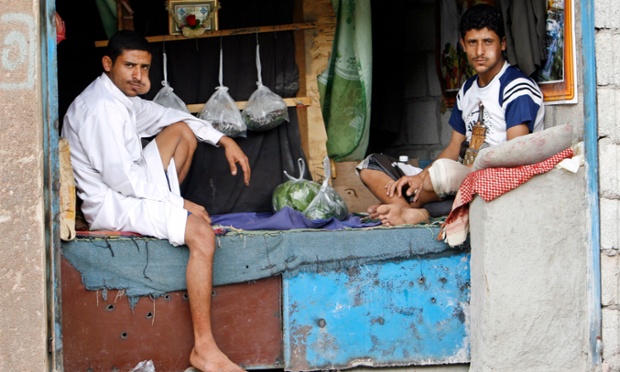
emeni men chew the narcotic at their shop in the main Khat market in Sana’a. Photograph: Ahmed Jadallah/Reuters/Corbis
Yemen (ANN/The guardian) Group allied with regional Islamist branch that overran Mukalla last month say users of the traditonal drug will be held responsible under sharia law.
Tribesmen in Yemen have imposed a ban on the drug khat in a southern port city overrun by al-Qaida in the Arabian Peninsula last month.
The tribe, who are allied with the regional Islamist branch and refer to themselves as Sons of Hadramawt, distributed pamphlets in Mukalla warning that chewing the leafy plant is banned and that violators will be “held fully responsible under sharia law”.
Yemeni men traditionally chew khat for several hours starting around midday, stuffing their cheeks with the leaves and letting the narcotic dissolve in their saliva. At these daily khat-chewing sessions, Yemenis recline on cushions, listen to traditional music, exchange gossip and engage in debates.
Pictures posted on social media showed tribesmen setting fire to piles of green leaves in the streets while others armed with assault rifles halted trucks carrying the plants and turned them away from the city.
Khat cultivation consumes 30% of the extremely scarce water resources in Yemen, the Arab world’s poorest country, and cuts into the production of other crops.
“Khat is a problem either way,” said Salem Dayan, a merchant in Mukalla. “If you ban it, people will have nothing to do to kill time, and if you lift the ban, you bring back the financial burden on your family.”
A person can spend from £3 to more than £30 on khat in a single session. Retired teacher Ahmed Basalma welcomed the ban, saying the drug “ruined lives and wrecked whole families”. But he conceded addicts would likely find a way around it.
Awad bin Dagher, a government employee, said there are no recreational alternatives to the drug. “We have nothing but the seafront,” he said. “I can’t imagine my life without khat.”
Khat is banned in the US and most European countries. It was banned in Britain in 2013.
Source: Theguardian.com
Araweelo News Network
Somaliland Office
Email info@araweelonews.com
Jaamac132@gmail.com
Twitter: Arraale M Jama @Araweelonews.




